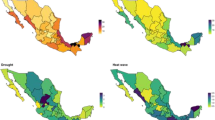Abstract
The school climate-strike movement has become a powerful force, shaping how people engage with climate change. Here we use a qualitative interview methodology to give voice to adolescents in the United Kingdom. We show how our participants—strikers and non-strikers alike—were united in framing climate change as an issue of intergenerational injustice, suggesting they may share one of the conditions for a politicized collective identity.

Similar content being viewed by others
Data availability
Data availability is subject to controlled access. Participants in this study consented to their data being stored securely at University of Bath and then destroyed. They did not consent to their data being shared.
References
Thiery, B. W. et al. Intergenerational inequities in exposure to climate extremes. Science 374, eabi7339 (2021).
Elliott, T. & Earl, J. Organizing the next generation: youth engagement with activism inside and outside of organizations. Soc. Media Soc. 4, 2056305117750722 (2018).
Fisher, D. R. The broader importance of #FridaysForFuture. Nat. Clim. Change 9, 430–431 (2019).
Wahlström, M. et al. (eds) Protest for a Future: Composition, Mobilization and Motives of the Participants in Fridays For Future Climate Protests on 15 March, 2019 in 13 European Cities (Keele Research Repository, 2019); https://eprints.keele.ac.uk/6571/7/20190709_Protest%20for%20a%20future_GCS%20Descriptive%20Report.pdf
Taylor, M., Watts, J. & Bartlett, J. Climate crisis: 6 million people join latest wave of global protests. The Guardian (27 September 2019); https://www.theguardian.com/environment/2019/sep/27/climate-crisis-6-million-people-join-latest-wave-of-worldwide-protests
Whitmarsh, L., O’Neill, S. & Lorenzoni, I. Public engagement with climate change: what do we know and where do we go from here? Int. J. Media Cult. Polit. 9, 7–25 (2013).
Van Zomeren, M., Postmes, T. & Spears, R. Toward an integrative social identity model of collective action: a quantitative research synthesis of three socio-psychological perspectives. Psychol. Bull. 134, 504–535 (2008).
Simon, B. & Klandermans, B. Politicized collective identity: a social psychological analysis. Am. Psychol. 56, 319–331 (2001).
Haugestad, C. A. et al. Why do youth participate in climate activism? A mixed-methods investigation of the #FridaysForFuture climate protests. J. Environ. Psychol. 76, 101647 (2021).
Matthews, H. D. et al. National contributions to observed global warming. Environ. Res. Lett. 9, 014010 (2014).
UK Becomes First Major Economy to Pass Net Zero Emissions Law (UK Government, 2019); https://www.gov.uk/government/news/uk-becomes-first-major-economy-to-pass-net-zero-emissions-law
Walker, C. Uneven solidarity: the school strikes for climate in global and intergenerational perspective. Sustain. Earth 3, 5 (2020).
Nielsen, K. S. et al. The role of high-socioeconomic-status people in locking in or rapidly reducing energy-driven greenhouse gas emissions. Nat. Energy 6, 1011–1016 (2021).
Neville, F. & Reicher, S. The experience of collective participation: shared identity, relatedness and emotionality. Contemp. Soc. Sci. 6, 377–396 (2011).
Bowman, B. ‘They don’t quite understand the importance of what we’re doing today’: the young people’s climate strikes as subaltern activism. Sustain. Earth 3, 16 (2020).
Šerek, J. & Lomičová, L. Adolescents’ transitions between different views on democracy: examining individual-level moderators. J. Appl. Dev. Psychol. 66, 101104 (2020).
Ojala, M. Regulating worry, promoting hope: how do children, adolescents, and young adults cope with climate change? Int. J. Environ. Sci. Educ. 7, 537–561 (2012).
Ojala, M. Hope and climate change: the importance of hope for environmental engagement among young people. Environ. Educ. Res. 18, 625–642 (2012).
Germaine, C. & Bowman, B. Not (Just) a Protest: The Youth Strike for Climate as Cultural Exchange and Collaborative Text (British Council, 2021).
Braun, V. & Clarke, V. Successful Qualitative Research: A Practical Guide for Beginners (Sage, 2013).
O’Reilly, M. & Parker, N. ‘Unsatisfactory saturation’: a critical exploration of the notion of saturated sample sizes in qualitative research. Qual. Res. 13, 190–197 (2013).
Low, J. A pragmatic definition of the concept of theoretical saturation. Sociol. Focus 52, 131–139 (2019).
Nelson, J. Using conceptual depth criteria: addressing the challenge of reaching saturation in qualitative research. Qual. Res. 17, 554–570 (2017).
Braun, V. & Clarke, V. To saturate or not to saturate? Questioning data saturation as a useful concept for thematic analysis and sample-size rationales. Qual. Res. Sport Exerc. Health 13, 201–216 (2021).
Braun, V. & Clarke, V. One size fits all? What counts as quality practice in (reflexive) thematic analysis? Qual. Res. Psychol. 18, 328–352 (2021).
Acknowledgements
We thank the 22 participants who took part in this research. The research was funded by an ESRC studentship awarded to K.L., grant number ES/J50015X/1.
Author information
Authors and Affiliations
Contributions
K.L. designed the study, conducted the interviews, analysed the data and drafted the paper. S.O., L.B. and J.B. contributed to the data analysis and reviewed and revised the paper.
Corresponding author
Ethics declarations
Competing interests
The authors declare no competing interests.
Peer review
Peer review information
Nature Climate Change thanks Sohana Nasrin, Séamus Power and the other, anonymous, reviewer(s) for their contribution to the peer review of this work.
Additional information
Publisher’s note Springer Nature remains neutral with regard to jurisdictional claims in published maps and institutional affiliations.
Supplementary information
Supplementary Information
Supplementary Table 2 and interview schedules.
Rights and permissions
About this article
Cite this article
Lee, K., O’Neill, S., Blackwood, L. et al. Perspectives of UK adolescents on the youth climate strikes. Nat. Clim. Chang. 12, 528–531 (2022). https://doi.org/10.1038/s41558-022-01361-1
Received:
Accepted:
Published:
Issue Date:
DOI: https://doi.org/10.1038/s41558-022-01361-1
- Springer Nature Limited
This article is cited by
-
Implementing climate literacy in schools — what to teach our teachers?
Climatic Change (2023)





